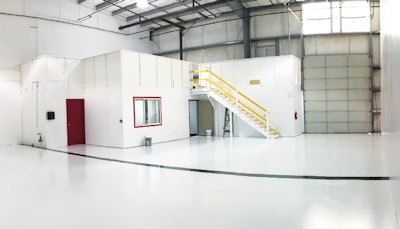
In mid-2011 Brooke Gehring’s business faced a potential disaster. Gehring, now CEO and co-founder of Denver-based FGS Inc., had to abandon a 30,000-square-foot cultivation facility she was renting because the bank foreclosed on the property.
“The police came and served a notice for the tenant that it was going to foreclosure, and none of that was disclosed [in advance],” she says. “There were a lot of attorneys on the transaction, so people were in breach of disclosure because the landlord was not transparent with us and their financial situation.”
At the time, Gehring operated as owner of a business called LiveGreen Consulting. Losses were in the hundreds of thousands of dollars, which included the loss of plants. Fortunately for Gehring, she was able to quickly find a partner who had available cultivation space. FGS now has six facilities and is a multimillion-dollar medical and recreational cannabis company.
Gehring learned several valuable lessons from her first leasing experience. One of them was to seek a landlord who owns the building outright and to negotiate options to purchase the building. As more growers look to expand or establish new operations, they should carefully examine their real estate options to avoid similar pitfalls.
Here are nine expert points to consider when seeking a new facility.
1. Seek Full Disclosure on Leases.
Make sure the landlord understands his or her legal responsibilities. Leases should clearly state that the facility will be used for cannabis cultivation. Don’t settle for language that’s vague, such as “medical services” or “horticulture,” Gehring says. If not, you could risk losing your license when you apply for renewal. Most licensing authorities require growers to provide copies of their lease when they apply for a new license or renewal, and require specific language indicating the landlord granted consent to cultivate.
“In the beginning, very early regulation landlords might [describe the building’s use as] ‘for horticulture’ or ‘medical services,’” Gehring says. “They were masking the actual use because they felt equally that they had risk with a lease in place that said ‘marijuana.’ So from the start, we identified owners that could lease us their properties with that full disclosure and transparency from Day 1.”
2. Check the Landlord’s Background.
Gehring’s experience serves as a reminder that the industry is still young. Growers need to be diligent when entering into facility lease agreements. Seek a landlord who has full rights to his or her property, Gehring recommends. Also, use public records to check the landlord’s financial background. Gehring relies on her real estate attorney to check the title on the building and ensure the corporation is in good standing.
Also, make sure whomever you’re dealing with is actually the landlord, says Blake Cisneros, a real estate broker with City Closers LLC in Seattle. Visit a tax parcel viewer online and make sure the name on the lease matches the name to the property, he adds.
3. Secure Flexible Lease Terms.
Try to negotiate the option to purchase the property at the end of the lease and right of first refusal, so you have long-term access to the facility. Right of first refusal means the tenant has the option to purchase the property before it’s sold to another party. These steps will help ensure that the facility will not be sold to another buyer and force you and your entire grow operation to have to relocate or evacuate with short notice. Also consider negotiating an agreement on a buyout price at the end of the lease. This can protect you if the property appreciates in value.
“As we know, real estate is typically an appreciating asset, so even if you have an option in five years to purchase the building, if the property has increased 35 percent more in value, they might put a premium on it,” Gehring says.
A real estate broker or an expert who is familiar with the commercial or industrial real estate market can help cultivators determine a fair market value based on comparable sales in the area, Gehring says.
4. Know Your Local Zoning Laws and Regulations.
Knowledge of local laws and the zoning codes is critical for future growth and expansion. Spend time researching local codes before you begin your property search, Cisneros says. He suggests that growers visit or call their city planners and ask them questions about zoning requirements.Gehring says she discovered that one of FGS’s facilities cannot expand beyond its stated use because it’s only zoned for medical use.
In addition, a new rule in Denver places restrictions on licenses if a facility is located within 1,000 feet of a residential neighborhood, Gehring says. “So best practice is to know your zoning,” Gehring explains. “And make sure you know what the local ordinance requires for a greenhouse, agricultural land or an industrial zone when you’re going through your search, before you’ve invested any money or made any improvements to a property.”
5. Be Professional.
Look like you mean business when you’re negotiating a lease.
“Make sure you present yourself in a professional way, so you’re taken more seriously,” Cisneros says. “That will be an added value to you as you move forward, so people respect you as a business person rather than looking at it as, ‘this is for stoners and hippies.’”
One of Kyle Kazan’s biggest turn-offs when he’s working with growers is egotism. Kazan is a managing member of Magu Capital, a group specializing in managing marijuana investment funds. “When I’ve been interviewing for different warehouses, the No. 1 thing to do is drop the arrogance,” Kazan says. “Every single cultivator I’ve met is ‘the best.’ ... Right away, it attacks credibility.”
6. Have a Coherent Business Plan.
When negotiating with investors or a property owner, make sure you can provide a detailed business plan. Investors, for example, may want to know when you plan to begin selling the product, the market for your product and when you expect to turn a profit, Kazan says. Investors, in particular, want to know the business value before they risk investing in a property.
“Before we even start to do a build-out [or] operating capital loans to get them going, there’s a time and money effort that’s quite intense,” he says.
In addition, many landlords may view the industry as a risky investment. “When a cultivator says, ‘I want to be your tenant, but I need some capital,’ they need to understand the landlord’s point of view and the rewards the landlord needs to get for the risk,” Kazan says, adding that cultivators who can show that they have capital and can pay for tenant improvements may appear less risky to a landlord.
7. Make a Checklist for Facility Requirements.
A broker can help cultivators navigate through legal and zoning requirements, as well as pricing and facility options. But if you decide to conduct your own search, be prepared with a list of facility requirements.
“Have a checklist of all the things you’re going to need for that space,” Cisneros says. “Make sure you’re going through and inspecting every nook and cranny of your space. And when a landlord sees you do that, he’s going to take you more seriously, too. That creates a deeper foundation for trust between you and the landlord because he knows you want everything above board, and so do they.”
8. Understand Your Power and Infrastructure Needs.

Don’t purchase a facility with the idea that you can retrofit it to meet your needs. “If the space does not already meet your power requirements, move on to the next,” Cisneros says. “It can get very costly to put in the proper voltage, so shop around a little bit.”
Brent Fisher, one of three principal owners with Black Label Cannabis LLC, in Tacoma, Wash., saw firsthand how poor planning upfront can impact operations. He moved to Washington state shortly after the recreational market opened. He partnered with a grower who was operating a facility in Tacoma and worked with the company for nearly two years.
The company rushed to lease a facility so it could acquire a license. In Washington state, as in many other states, a license must be attached to a physical location, Fisher says. The company didn’t spend enough time determining its needs before renting the space, he adds.
“They had to haul 55-gallon jugs of water on a pallet so they could try to water a plant,” Fisher recalls. “We rented a section of a previous pickle factory. Our section did not happen have a water source, so we had to borrow a fork lift to pallet four 55-gallon drums, fill them with a water hose (about four hours), and then filter through a makeshift water filter ... every other day. The landlord was just getting water tapped into our section after one year. But, that was the landscape in the genesis of the industry. Now a billion-dollar industry in Washington, the environment is far more developed today.”
9. Negotiate Start-Up Dates.
Fisher recommends negotiating terms that provide you with time to prepare the facility for operation before monthly rent payments begin. Fisher’s previous business paid rent for nine months before the facility was operational. Ask for permission or have an agreement in place that allows for time to prep the facility and process regulatory paperwork.
Lesson learned: “You want to have an idea of what your build-out is going to look like; try to find a space that best meets that and then focus on your timeline on when you can get inspected versus how long is it going to take you to build-out.”















